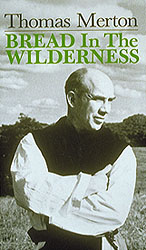
"They interrupt their work in the fields or the workshops of the monastery to sing the Psalms of the day hours. They recite Psalms after their meals and practically the last words on their lips at night are verses written hundreds of years ago by one of the Psalmists.
"For the monk who really enters into the full meaning of his vocation, the Psalms are the nourishment of his interior life and form the material of his meditations and of his own personal prayer, so that at last he comes to live them and experience them as if they were his own songs, his own prayers.
"This would not be possible if the Psalms were nothing more than literature to those who have to pray them every day. 'Art' and 'literature' as such no doubt have a part to play in the monastic life. But when a man lives in the naked depths of an impoverished spirit, face to face with nothing but spiritual realities for year after year, art and literature can come to seem peculiarly shabby and unsubstantial--or else they become a lure and a temptation. In either case, they are a potential source of unrest and of dissatisfaction.
"Yet the liturgical prayer of the monk is one of the great pacifying influences in a life that is all devoted to serenity and interior peace. There is only one explanation for this. The Psalms acquire, for those who know how to enter into them, a surprising depth, a marvelous and inexhaustible actuality. They are bread, miraculously provided by Christ, to feed those who have followed Him into the wilderness. I use this symbol advisedly. The miracle of the multiplication of the loaves usually suggests the Sacrament of the Eucharist, which it foreshadowed: but the reality which nourishes us in the Psalms is the same reality which nourishes us in the Eucharist, though in a far different form. In either case, we are fed by the Word of God. In the Blessed Sacrament, 'His flesh is food indeed.' In the Scriptures, the Word is incarnate not in flesh but in human words. But man lives by every word that proceeds from the mouth of God.
"This book is not a systematic treatise, but only a collection of personal notes on the Psalter. They are the notes of a monk, written in the monastic tradition, and one supposes that they might appeal above all to monks. But in this mysterious age, there is no telling whom the book may reach--although no one expects it to reach everybody.
"Perhaps, by its very nature, the book should pretend to address itself to those who do not quite understand why they are obliged, by reason of their vocation, to make the Psalms the substance of their prayer. In any case these pages attempt to put forth a few reasons why the Psalms in spite of their antiquity ought to be considered one of the most valid forms of prayer for men of all time. As for those readers who can only regard the Psalms as 'literature'– this book will at least offer them some of the reasons why the Psalter seems to be more than literature to those of us who have made it our bread in the wilderness." - from the Prologue
(Purchase of this book helps you qualify for the free shipping option on your order.)